11 start with B start with B

The full story of barbecue in the United States had been virtually untold before Robert F. Moss revealed its long, rich history in his 2010 book Barbecue: The History of an American Institution. Moss researched hundreds of sources—newspapers, letters, journals, diaries, and travel narratives—to document the evolution of barbecue from its origins among Native Americans to its present status as an icon of American culture. He mapped out the development of the rich array of regional barbecue styles, chronicled the rise of barbecue restaurants, and profiled the famed pitmasters who made the tradition what it is today.
Barbecue is the story not just of a dish but also of a social institution that helped shape many regional cultures of the United States. The history begins with British colonists’ adoption of barbecuing techniques from Native Americans in the 17th and 18th centuries, moves to barbecue’s establishment as the preeminent form of public celebration in the 19th century, and is carried through to barbecue’s ubiquitous standing today.
From the very beginning, barbecues were powerful social magnets, drawing together people from a wide range of classes and geographic backgrounds. Barbecue played a key role in three centuries of American history, both reflecting and influencing the direction of an evolving society. By tracing the story of barbecue from its origins to today, Barbecue: The History of an American Institution traces the very thread of American social history.
Moss has made significant updates in this new edition, offering a wealth of new historical research, sources, illustrations, and anecdotes.

Barons is the story of seven corporate titans, their rise to power, and the consequences for everyone else. Take Mike McCloskey, Chairman of Fair Oaks Farms. In a few short decades, he went from managing a modest dairy herd to running the Disneyland of agriculture, where school children ride trams through mechanized warehouses filled with tens of thousands of cows that never see the light of day. What was the key to his success? Hard work and exceptional business savvy? Maybe. But more than anything else, Mike benefitted from deregulation of the American food industry, a phenomenon that has consolidated wealth in the hands of select tycoons, and along the way, hollowed out the nation’s rural towns and local businesses.
Along with Mike McCloskey, readers will meet a secretive German family that took over the global coffee industry in less than a decade, relying on wealth traced back to the Nazis to gobble up countless independent roasters. They will discover how a small grain business transformed itself into an empire bigger than Koch Industries, with ample help from taxpayer dollars. And they will learn that in the food business, crime really does pay—especially when you can bribe and then double-cross the president of Brazil.
These, and the other stories in this book, are simply examples of the monopolies and ubiquitous corruption that today define American food. The tycoons profiled in these pages are hardly unique: many other companies have manipulated our lax laws and failed policies for their own benefit, to the detriment of our neighborhoods, livelihoods, and our democracy itself. Barons paints a stark portrait of the consequences of corporate consolidation, but it also shows we can choose a different path. A fair, healthy, and prosperous food industry is possible—if we take back power from the barons who have robbed us of it.

With insight from social scientists, beer bloggers, travel writers, and food entrepreneurs who recount their experiences of taprooms, breweries, and bottle shops from North Carolina to Zimbabwe, Beer Places reveals differences in the craft beer scene across multiple geographies. Situating craft beer as an emerging and important component of food studies, the essays in this volume attest to the singular power of craft beer to connect people and places.
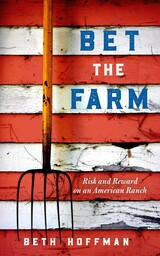
Beth Hoffman was living the good life: she had a successful career as a journalist and professor, a comfortable home in San Francisco, and plenty of close friends and family. Yet in her late 40s, she and her husband decided to leave the big city and move to his family ranch in Iowa—all for the dream of becoming a farmer, to put into practice everything she had learned over decades of reporting on food and agriculture. There was just one problem: money.
Half of America's two million farms made less than $300 in 2019. Between rising land costs, ever-more expensive equipment, the growing uncertainty of the climate, and few options for health care, farming today is a risky business. For many, simply staying afloat is a constant struggle.
Bet the Farm chronicles this struggle through Beth’s eyes as a beginning farmer. She must contend with her father-in-law, who is reluctant to hand over control of the land. Growing oats is good for the environment but ends up being very bad for the wallet. And finding somewhere, in the midst of COVID-19, to slaughter grass-finished beef is a nightmare. The couple also must balance the books, hoping that farming isn’t a romantic fantasy that takes every cent of their savings.
Even with a decent nest egg and access to land, making ends meet at times seems impossible. And Beth knows full well that she is among the privileged. If Beth can’t make it, how can farmers who confront racism, lack access to land, or don’t have other jobs to fall back on? Bet the Farm is a first-hand account of the perils of farming today and a personal exploration of more just and sustainable ways of producing food.
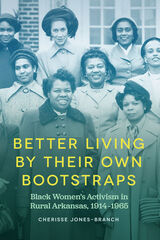
The first major study to consider Black women’s activism in rural Arkansas, Better Living by Their Own Bootstraps foregrounds activists’ quest to improve Black communities through language and foodways as well as politics and community organizing. In reexamining these efforts, Cherisse Jones-Branch lifts many important figures out of obscurity, positioning them squarely within Arkansas’s agrarian history.
The Black women activists highlighted here include home demonstration agents employed by the Arkansas Agricultural Cooperative Extension Service and Jeanes Supervising Industrial Teachers, all of whom possessed an acute understanding of the difficulties that African Americans faced in rural spaces. Examining these activists through a historical lens, Jones-Branch reveals how educated, middle-class Black women worked with their less-educated rural sisters to create all-female spaces where they confronted economic, educational, public health, political, and theological concerns free from white regulation and interference.
Centered on the period between 1914 and 1965, Better Living by Their Own Bootstraps brings long-overdue attention to an important chapter in Arkansas history, spotlighting a group of Black women activists who uplifted their communities while subverting the formidable structures of white supremacy.
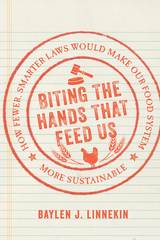
Food waste, hunger, inhumane livestock conditions, disappearing fish stocks—these are exactly the kind of issues we expect food regulations to combat. Yet, today in the United States, laws exist at all levels of government that actually make these problems worse. Baylen Linnekin argues that, too often, government rules handcuff America’s most sustainable farmers, producers, sellers, and consumers, while rewarding those whose practices are anything but sustainable.
Biting the Hands that Feed Us introduces readers to the perverse consequences of many food rules. Some of these rules constrain the sale of “ugly” fruits and vegetables, relegating bushels of tasty but misshapen carrots and strawberries to food waste. Other rules have threatened to treat manure—the lifeblood of organic fertilization—as a toxin. Still other rules prevent sharing food with the homeless and others in need. There are even rules that prohibit people from growing fruits and vegetables in their own yards.
Linnekin also explores what makes for a good food law—often, he explains, these emphasize good outcomes rather than rigid processes. But he urges readers to be wary of efforts to regulate our way to a greener food system, calling instead for empowerment of those working to feed us—and themselves—sustainably.
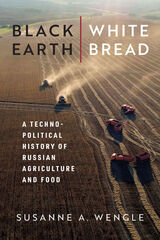
Examining governance, production, consumption, nature, and the ensuing vulnerabilities of the agrifood system, Wengle reveals the intended and unintended consequences of Russian agricultural policies since 1917. Ultimately, Black Earth, White Bread calls attention to Russian technopolitics and how macro systems of government impact life on a daily, quotidian level.
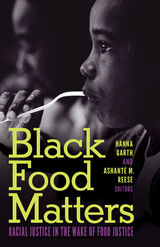
An in-depth look at Black food and the challenges it faces today
For Black Americans, the food system is broken. When it comes to nutrition, Black consumers experience an unjust and inequitable distribution of resources. Black Food Matters examines these issues through in-depth essays that analyze how Blackness is contested through food, differing ideas of what makes our sustenance “healthy,” and Black individuals’ own beliefs about what their cuisine should be.
Primarily written by nonwhite scholars, and framed through a focus on Black agency instead of deprivation, the essays here showcase Black communities fighting for the survival of their food culture. The book takes readers into the real world of Black sustenance, examining animal husbandry practices in South Carolina, the work done by the Black Panthers to ensure food equality, and Black women who are pioneering urban agriculture. These essays also explore individual and community values, the influence of history, and the ongoing struggle to meet needs and affirm Black life.
A comprehensive look at Black food culture and the various forms of violence that threaten the future of this cuisine, Black Food Matters centers Blackness in a field that has too often framed Black issues through a white-centric lens, offering new ways to think about access, privilege, equity, and justice.
Contributors: Adam Bledsoe, U of Minnesota; Billy Hall; Analena Hope Hassberg, California State Polytechnic U, Pomona; Yuson Jung, Wayne State U; Kimberly Kasper, Rhodes College; Tyler McCreary, Florida State U; Andrew Newman, Wayne State U; Gillian Richards-Greaves, Coastal Carolina U; Monica M. White, U of Wisconsin–Madison; Brian Williams, Mississippi State U; Judith Williams, Florida International U; Psyche Williams-Forson, U of Maryland, College Park; Willie J. Wright, Rutgers U.
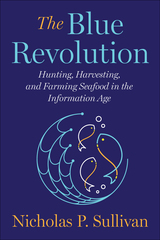
Nicholas P. Sullivan presents this new way of thinking about fish, food, and oceans by profiling the people and policies transforming an aging industry into one that is “post-industrial”—fueled by “sea-foodies” and locavores interested in sustainable, traceable, quality seafood. Catch quotas can work when local fishers feel they have a stake in the outcome; shellfish farming requires zero inputs and restores nearshore ecosystems; new markets are developing for kelp products, as well as unloved and “underutilized” fish species. Sullivan shows how the practices of thirty years ago that perpetuated an overfishing crisis are rapidly changing. In the book’s final chapters, Sullivan discusses the global challenges to preserving healthy oceans, including conservation mechanisms, the impact of climate change, and unregulated and criminal fishing in international waters.
In a fast-growing world where more people are eating more fish than ever before, The Blue Revolution brings encouraging news for conservationists and seafood lovers about the transformation of an industry historically averse to change, and it presents fresh inspiration for entrepreneurs and investors eager for new opportunities in a blue-green economy.
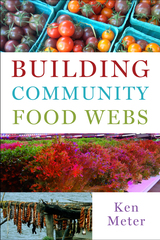
Community food webs strive to build health, wealth, capacity, and connection. Their essential element is building greater respect and mutual trust, so community members can more effectively empower themselves and address local challenges. Farmers and researchers may convene to improve farming practices collaboratively. Health clinics help clients grow food for themselves and attain better health. Food banks engage their customers to challenge the root causes of poverty. Municipalities invest large sums to protect farmland from development. Developers forge links among local businesses to strengthen economic trade. Leaders in communities marginalized by our current food system are charting a new path forward.
Building Community Food Webs captures the essence of these efforts, underway in diverse places including Montana, Hawai‘i, Vermont, Arizona, Colorado, Indiana, and Minnesota. Addressing challenges as well as opportunities, Meter offers pragmatic insights for community food leaders and other grassroots activists alike.

Exposes and explores the prevalence of racist restaurant branding in the United States
Aunt Jemima is the face of pancake mix. Uncle Ben sells rice. Chef Rastus shills for Cream of Wheat. Stereotyped Black faces and bodies have long promoted retail food products that are household names. Much less visible to the public are the numerous restaurants that deploy unapologetically racist logos, themes, and architecture. These marketing concepts, which center nostalgia for a racist past and commemoration of our racist present, reveal the deeply entrenched American investment in anti-blackness. Drawing on wide-ranging sources from the late 1800s to the present, Burgers in Blackface gives a powerful account, and rebuke, of historical and contemporary racism in restaurant branding.
Forerunners: Ideas First
Short books of thought-in-process scholarship, where intense analysis, questioning, and speculation take the lead
READERS
Browse our collection.
PUBLISHERS
See BiblioVault's publisher services.
STUDENT SERVICES
Files for college accessibility offices.
UChicago Accessibility Resources
home | accessibility | search | about | contact us
BiblioVault ® 2001 - 2024
The University of Chicago Press









